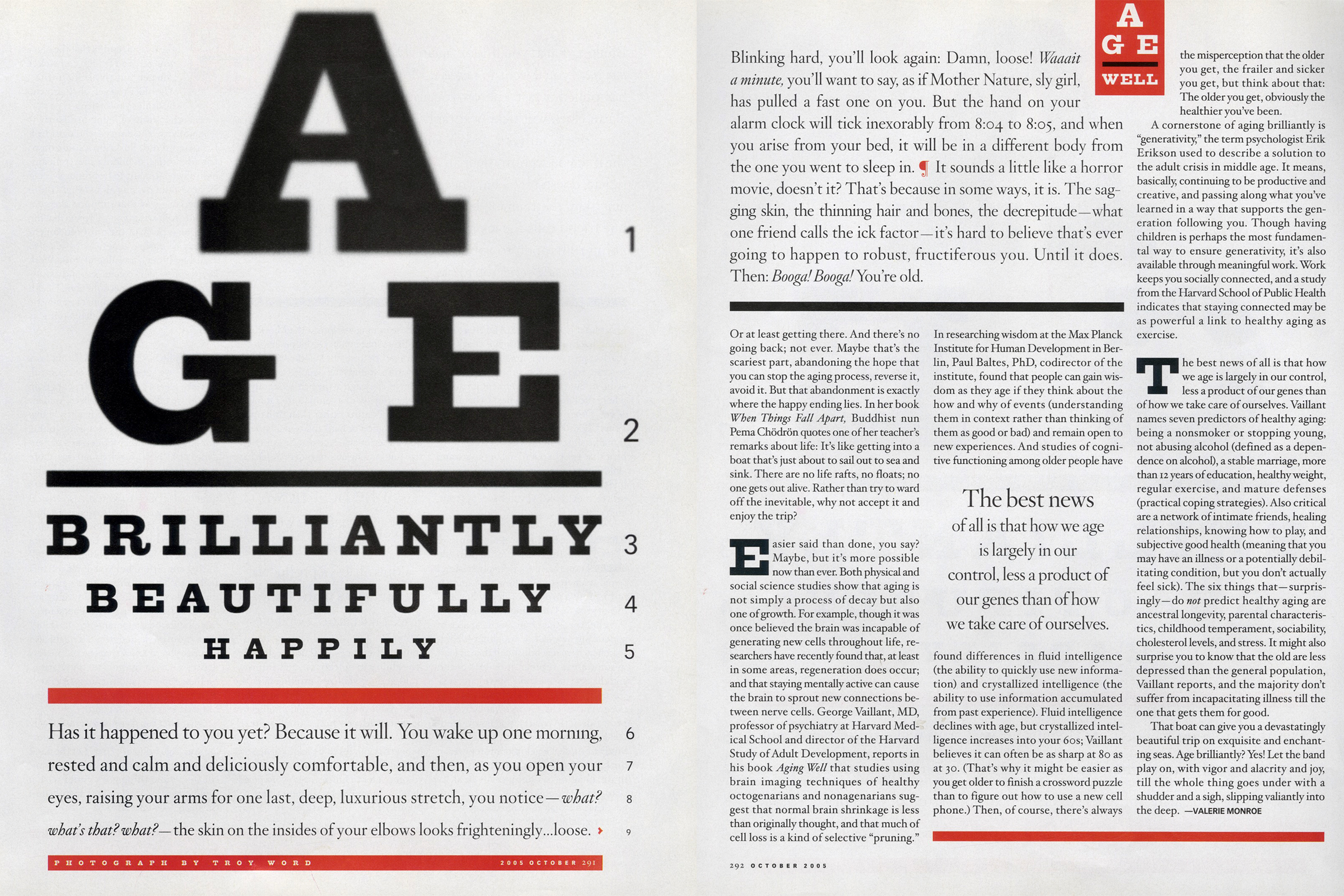Age Brilliantly Beautifully Happily
Has it happened to you yet? Because it will. You wake up one morning, rested and calm and deliciously comfortable, and then, as you open your eyes, raising your arms for one last, deep, luxurious stretch, you notice—what? what’s that? what?— the skin on the insides of your elbows looks frighteningly...loose. Blinking hard, you’ll look again: Damn, loose! Waaait a minute, you’ll want to say, as if Mother Nature, sly girl, has pulled a fast one on you. But the hand on your alarm clock will tick inexorably from 8:04 to 8:05, and when you arise from your bed, it will be in a different body from the one you went to sleep in. It sounds a little like a horror movie, doesn’t it? That’s because in some ways, it is. The sagging skin, the thinning hair and bones, the decrepitude—what one friend calls the ick factor—it’s hard to believe that’s ever going to happen to robust, fructiferous you. Until it does. Then: Booga! Booga! You’re old.
Or at least getting there. And there’s no going back; not ever. Maybe that’s the scariest part, abandoning the hope that you can stop the aging process, reverse it, avoid it. But that abandonment is exactly where the happy ending lies. In her book When Things Fall Apart, Buddhist nun Pema Chodron quotes one of her teacher’s remarks about life: It’s like getting into a boat that’s just about to sail out to sea and sink. There are no life rafts, no floats; no one gets out alive. Rather than try to ward off the inevitable, why not accept it and enjoy the trip?
Easier said than done, you say? Maybe, but it’s more possible now than ever. Both physical and social science studies show that aging is not simply a process of decay but also one of growth. For example, though it was once believed the brain was incapable of generating new cells throughout life, researchers have recently found that, at least in some areas, regeneration does occur; and that staying mentally active can cause the brain to sprout new connections between nerve cells. George Vaillant, MD, professor of psychiatry at Harvard Medical School and director of the Harvard Study of Adult Development, reports in his book Aging Well that studies using brain imaging techniques of healthy octogenarians and nonagenarians suggest that normal brain shrinkage is less than originally thought, and that much of cell loss is a kind of selective “pruning.”
In researching wisdom at the Max Planck Institute for Human Development in Berlin, Paul Baltes, PhD, codirector of the institute, found that people can gain wisdom as they age if they think about the how and why of events (understanding them in context rather than thinking of them as good or bad) and remain open to new experiences. And studies of cognitive functioning among older people have found differences in fluid intelligence (the ability to quickly use new information) and crystallized intelligence (the ability to use information accumulated from past experience). Fluid intelligence declines with age, but crystallized intelligence increases into your 60s; Vaillant believes it can often be as sharp at 80 as at 30. (That’s why it might be easier as you get older to finish a crossword puzzle than to figure out how to use a new cell phone.) Then, of course, there’s always the misperception that the older you get, the frailer and sicker you get, but think about that: The older you get, obviously the healthier you’ve been.
A cornerstone of aging brilliantly is “generativity,” the term psychologist Erik Erikson used to describe a solution to the adult crisis in middle age. It means, basically, continuing to be productive and creative, and passing along what you’ve learned in a way that supports the generation following you. Though having children is perhaps the most fundamental way to ensure generativity, it’s also available through meaningful work. Work keeps you socially connected, and a study from the Harvard School of Public Health indicates that staying connected may be as powerful a link to healthy aging as exercise.
The best news of all is that how we age is largely in our control, less a product of our genes than of how we take care of ourselves. Vaillant names seven predictors of healthy aging: being a nonsmoker or stopping young, not abusing alcohol (defined as a dependence on alcohol), a stable marriage, more than 12 years of education, healthy weight, regular exercise, and mature defenses (practical coping strategies). Also critical are a network of intimate friends, healing relationships, knowing how to play, and subjective good health (meaning that you may have an illness or a potentially debilitating condition, but you don’t actually feel sick). The six things that—surprisingly—do not predict healthy aging are ancestral longevity, parental characteristics, childhood temperament, sociability, cholesterol levels, and stress. It might also surprise you to know that the old are less depressed than the general population, Vaillant reports, and the majority don’t suffer from incapacitating illness till the one that gets them for good.
That boat can give you a devastatingly beautiful trip on exquisite and enchanting seas. Age brilliantly? Yes! Let the band play on, with vigor and alacrity and joy, till the whole thing goes under with a shudder and a sigh, slipping valiantly into the deep.

